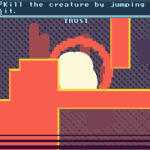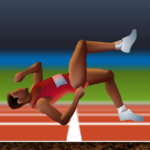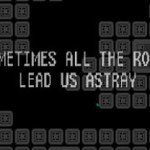Loved (2010)
March 18, 2011 - Features
The hostile guide has become a common trope in art and indie games (not to mention some bigger games like Portal). Designers can’t get enough of having a disembodied voice berate you and lead you astray. In Seven Minutes (review), a furious floating head tries to convince you that you can only win the game by not playing it. In Time Fcuk, your future self seems to give you advice at first but gets increasingly confused and alarming. A 2010 Global Game Jam entry called depict1 takes this to its logical extreme: everything the guide tells you about how to play the game is wrong.
I suspect this trend arises from designers grappling with the use of tutorials in games. It’s a common complaint that modern games seemingly require longer and longer tutorials and more and more guidance. In the original Legend of Zelda, you got this:

While in The Ocarina of Time and subsequent Zelda games, you get a little fairy that follows you throughout the game and constantly tells you what to do next. Whether this expansion of the tutorial is a necessary consequence of games getting more complicated, the industry appealing to less experienced players, the realization that no one actually RsTFM, or just lazy design remains a lively area of debate.
Whatever the reason, anxiety or annoyance over heavy guidance in modern games seems to be inspiring designers to play with the aggressive aspects of this guidance. In a sense, the fact that a game like depict1 or Time Fcuk remains playable despite the unhelpfulness of its instructions serves as a counterexample of sorts to the need for such instructions. Mostly, though, the dissonance is just really funny.
Alexander Ocias’s Loved, on the other hand, is a short platformer in which the hostile guide is used to dramatic rather than comedic effect. Throughout the game, the guide asks you questions, often responding angrily or cruelly to the answers. It also gives you several instructions within the game, some of which are helpful and some of which will get you killed. If you follow these instructions, the guide rewards you by adding detail to the blocky game world, making it easier to see the platforms and spikes you’re dealing with. If you disobey, colorful blocks of noise begin to surround you, to the point where you can’t see the environment anymore.
This all very effectively serves Loved‘s overall metaphor of a game as an abusive relationship. If you do what the game wants, things get easier, but it’s all very demeaning (and the game itself will hurt you sometimes). If you refuse, the game gets harder, which makes it more rewarding when you do beat it. Your rejection of the abuse becomes a visual rejection of the game environment itself, which you nonetheless have to navigate to escape. The extent to which Ocias fine-tunes this metaphor and builds it into the game’s design is truly impressive, and I found Loved to be a very affecting experience as a result.
It is exciting to see a clever comedic trope like the hostile guide doing more emotional heavy lifting. Part of me suspects that comedy has an easier time discovering narrative innovations than drama. It’s promising to see this process happening in games.



